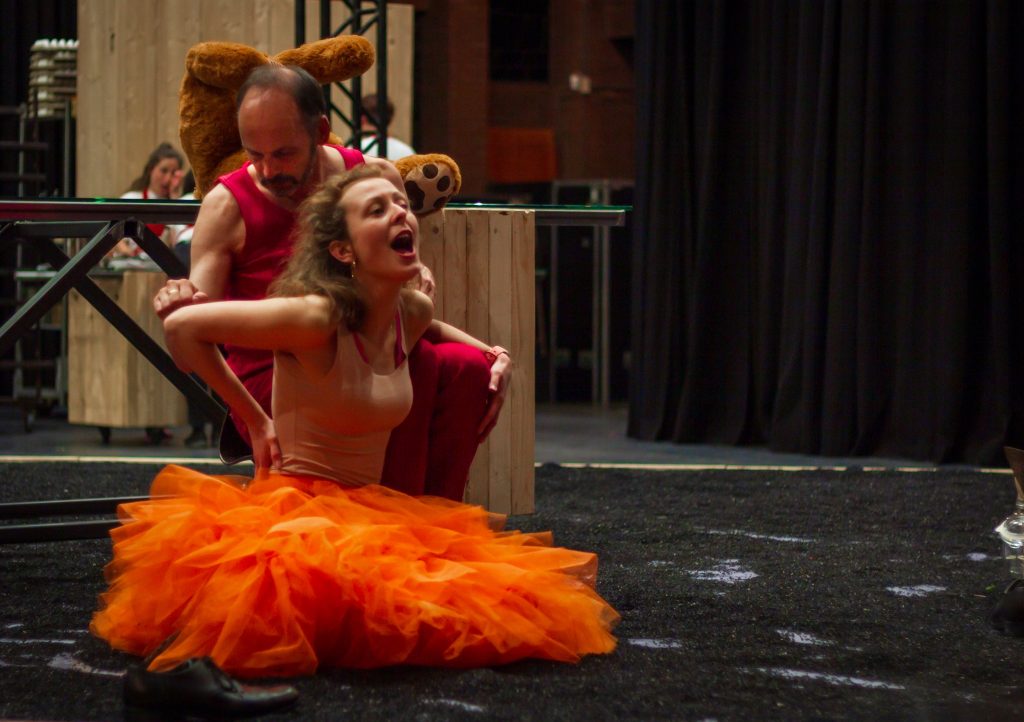Interview with Jan Wouters & Kristina Bitenc
In the romantic opera A Midsummer Night’s Dream, the kingdom of fairy king Oberon turns into a playground for love. Oberon and Titania are the only stable relationship in this opera, where everyone falls in love with everyone. Although, stable? They fight each other out of the tent. A conversation with Jan Wouters (Oberon) and Kristina Bitenc (Titania) about love.
How do you describe the relationship between Oberon and Titania?
Jan: ‘Oberon mainly exercises power and wants to control everything that Titania does. He sees his wife as a tool. Everything she owns, he may own.’
Kristina: ‘As a mother, Titania fights for the protection of her children. She is constantly on guard and doesn’t let Oberon get too close to the kids. Often that goes well and she can compete with her husband, but in Oberon’s hands she sometimes suddenly turns into a puppet doll.’
Jan: ‘Titania cannot resist Oberon’s magic. We start as two equal characters. But Titania very quickly assumes the protective mother role, changing the hierarchy.’
What’s it like to argue on stage?
Jan: ‘I find anger to be the easiest emotion to play verbally. You do have to trust each other to fully immerse yourself in the music and make an argument seem real. Such a scene is very intense. I have learned to use things from my private life to convey feelings but not show the specific part of it. With two older sisters, I remember very well what arguing is like.’
Kristina: ‘I experience arguing as a dance. One pass brings you close together, the next drives you apart. I hardly ever fight at home. So I have to look elsewhere for this emotion and come up with a situation to empathize with.’
What makes A Midsummer Night’s Dream still relevant today?
Kristina: ‘Shakespeare wrote A Midsummer Night’s Dream in 1600, but since then the dynamics and relationships between people have hardly changed. There are also social themes in this opera that are still topical; from homophilia and pedophilia to motherhood and feminism.’
Jan: ‘The piece shows that something can change with every snap of the fingers. The drop of magic juice is literally the drop that breaks the camel’s back or the drop of a new beginning. The opening scene with a divorce over a child is also still relevant. Parents think they are doing this out of love for their child, but that is of course not entirely true. ‘
How do you see love yourself?
Kristina: ‘When I see my parents, who have been together for almost 40 years, still walking hand in hand, I believe in monogamous love. Love to me is trust, that you can remain yourself in a relationship and that the other makes you a better person.’
‘I’m monogamous too. If things are going well at home, you don’t have to look any further.’
Jan: ‘That’s what I call love. You can feel love for many people and things; friends, children, flowers. But love can only be projected on one person. It starts with love, which can turn into infatuation.’
Kristina: ‘Funny, I see it exactly the other way around. Infatuation can develop into love. Love follows a constant long line, in which you are sometimes in love and sometimes you are not.’
Jan: ‘Look, then we have something to argue about.’
INFO & TICKETS: www.operazuid.nl/amnd
Interview: Manon Berns
